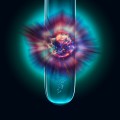|
Scientist
>
Prof Dr Reinhard Renneberg
Prof Dr Reinhard Renneberg
// born 1951, studied chemistry at Lomonossov University, Moscow Nano Crystals for mega Fluorescence AmplificationSuperNova in the test tube - von Prof Dr Reinhard Renneberg, Jan Engels, Dr Hans-Georg Eisenwiener
We tell the exciting story of how mega fluorescence amplification was invented.
First, there was the question: How can previous biochemical evidence reactions be amplified million-fold to detect the biochemical “needles in a haystack” (substances at very low concentrations) in a multicomponent system like a blood sample?  The earliest plasma marker for myocardial infarctionFabulous FABP - von Prof Dr Reinhard Renneberg, Prof. Dr Jan F.C. Glatz
The application of Fatty Acid-Binding Protein (FABP) as a plasma marker for the diagnosis of acute myocardial infarction was first suggested in 1988. Currently, FABP is proven to have added value for the diagnosis of patients presenting with chest pain suggestive of myocardial infarction, especially in the early hours after onset of symptoms. The routine application of FABP for this purpose not only will improve patient outcome but also markedly...
 |
|






